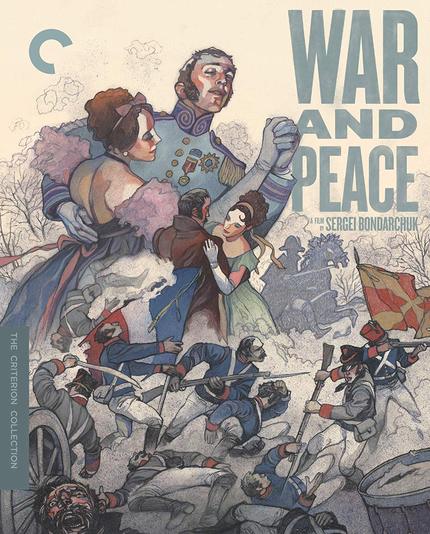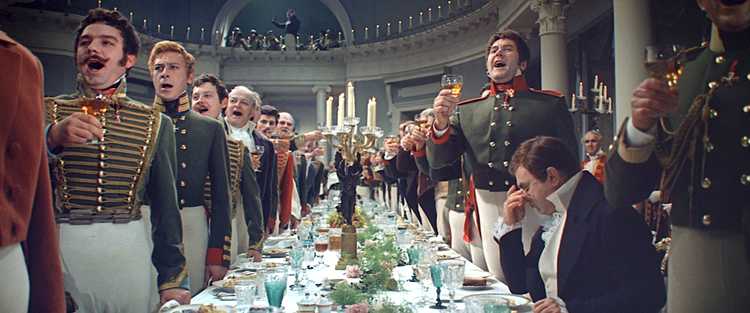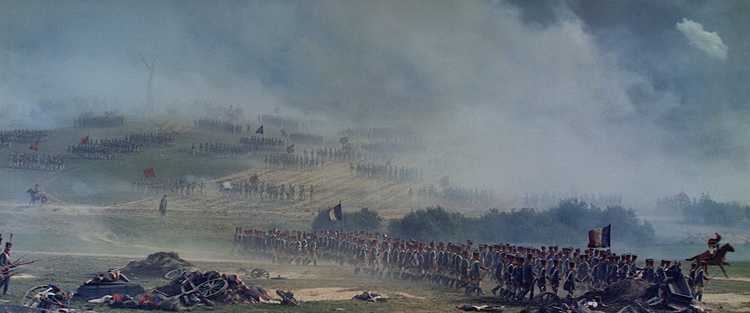Review: WAR AND PEACE Blasts Lavishly as Criterion Blu-ray Set
Director Sergei Bondarchuk's seven-hour Leo Tolstoy adaptation aims to put Hollywood's Audrey Hepburn version to shame.

Definitive. When someone makes the claim that something they’re creating will be “definitive”, look out. When that someone has something to prove and unlimited funding, brace yourself. And, when that someone is the Cold War-era Soviet Union, you’d better believe that ALL workers of that world will unite, whether they want to or not.
In the late 1950s, through some sort of negotiated cultural exchange program, director King Vidor’s 1956 Hollywood adaptation of Leo Tolstoy’s profoundly Russian War and Peace premiered in the Soviet Union. Though the Soviets had upended and usurped the classic Russia that Tolstoy’s masterpiece venerates, the deep-seated nationalist pride both for that time and place stemming from it remained ingrained as part of U.S.S.R. culture. The Motherland success of the American version, starring Audrey Hepburn and Henry Fonda, led the humiliated Soviet Powers That Be to decree the creation of the country’s own film version of the epic tome. That’s right... War and Peace would come home- bigger and better than ever!
And so, with a cast of literal thousands upon thousands, unlimited resources, and a state-sanctioned blank check, director Sergei Bondarchuk’s War and Peace came to pass. With only one other film under his belt, the choice of this director as the one to head up this truly military-grade operation proved to be quite a surprise to the highly competitive Soviet film industry. Colin Trevorrow being tapped to helm the almighty franchise revival Jurassic World hot of Safety Not Guaranteed comes to mind. Is Bondarchuk the Colin Trevorrow of said Soviet film industry?
Not entirely. While similarly proving himself entirely competent in his ability to craft a satisfying spectacle that tops out at “bigger than big”, Bondarchuk had the self-imposed added weight of having to carry the film onscreen as one of its primary leads. That’s right, on top of the unprecedented demands of helming a multi-year production of a meticulously historically accurate adaptation of his nation’s most beloved novel, he also saw fit to cast himself in the central role of the noble but nebbish Pierre Bezukhov. This decision- a source of further anger and jealousy for many at the time- becomes somewhat clearer with the knowledge that Bondarchuk was an actor first. So even as his director’s chair was relatively unworn, he’d been around filmmaking and filmmakers enough to assume an assumed knowledge of when not to delegate. (Or so one assumes). Fortunately, despite claims that he was too old and physically all wrong for the part, Bondarchuk is no liability on screen. A good thing, too, as his Bezukhov assumes center stage for much of the third and fourth installments of this four-part War and Peace.
If one arrives at Criterion’s attractive Blu-ray release of War and Peace knowing nothing else about it, what likely is known is that the book is long. Long in a grand way, of course. Literature veterans, then, can attest to the quantum accuracy of this seven-hour-and-two-minute adaptation, along with the stifling weight of its very physicality and pomp and circumstance. Whether a miles-wide re-creation of the Napoleonic Wars stocked with a literal army outfitted in 1812 attire or an ultra-lavish high society ball, War and Peace demonstrates its nearly boundless resources. With unprecedented access to the nation’s military and cultural archives (museums were forced to turn their priceless antiques over to the filmmakers for set dressing and prop usage), this four-part four-poster earns its breathtaking muchness, and then some. Such ornate measures are the filmmaking equivalent of washing behind your ears or wearing fancy underwear under your clothes: most people will never know. But I suppose it knows.
Part intimate drama, part unrelenting war showcase, one can’t make the argument that Bondarchuk and his massive cast and crew don’t deliver. Particularly revelatory is Lyudmila Saveleva as heroine Natasha Rostova, the part popularly played by Audrey Hepburn in the King Vidor version. Saveleva’s Hepburn resemblance is pronounced, it’s true. But even so, the character becomes her own as she literally ages into young womanhood on screen. Vyacheslav Tikhonov plays the chronically unfortunate Prince Andrei Bolkonsky, the third part of the troubled love triangle (though aren’t they all?) that Rostova throws into chaos thanks to her girlish romanticism. Even when War and Peace is a soap opera, there’s nothing small about it.
There’s seemingly no end to the list of things worth admiring about this Biggest Of All Movies. And yet, it’s somehow strangely hard to get inspired to truly wax eloquently about War and Peace. That is, except to say that it is a sensuously spinning, whirling, fixating, exploding ongoing panoply of grandiosity that simply will not be denied.
The whole of Bondarchuk’s War and Peace is divided into four not-quite-equally-length stand-alone films, each with its own opening titles and distinct closing. In the Soviet Union, each of these parts was its own separate 70mm theatrical release, hitting screens months if not a year apart. They are as follows: I: Andrei Bolkonsky (1965), II: Natasha Rostova (1966), III: 1812 (1967) and IV: Pierre Bezukhov. In my own experience as a War and Peace novice up until this Blu-ray, the whole of it all becomes increasingly more engaging on an emotional level as these parts go on. On the level of sheer scope, though, War and Peace never fails to impress from minute one. It truly is, as they say, bigger than a really big thing, in fact! Definitive, even.
Criterion has done great justice to the meticulously 2K restored War and Peace, spreading it across two discs and packing them out with special features both new and old. Those features are:
• New interviews with cinematographer Anatoly Petritsky and filmmaker Fedor Bondarchuk, son of director Sergei Bondarchuk
• Two documentaries, from 1966 and 1969, about the making of the film
• Television program from 1967 on actor Ludmila Savelyeva, featuring Sergei Bondarchuk
• New program with historian Denise J. Youngblood (Bondarchuk’s War and Peace: Literary Classic to Soviet Cinematic Epic) detailing the cultural and historical contexts for the film
• Janus Films rerelease trailer
• New English subtitle translation
• PLUS: A folded poster-sized printed essay by critic Ella Taylor









